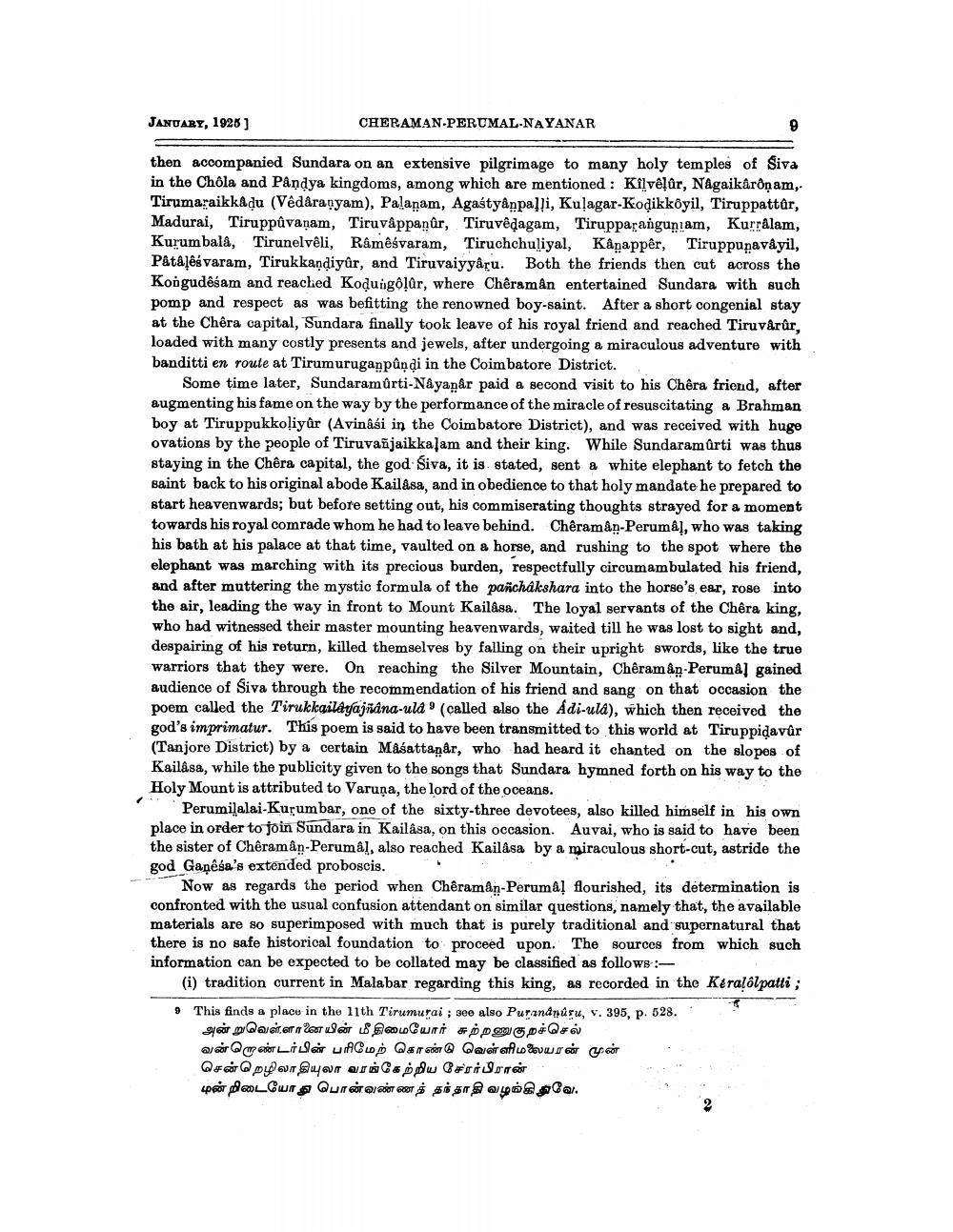________________
JANUARY, 1928)
CHERAMAN-PERUMAL-NAYANAR
then accompanied Sundara on an extensive pilgrimage to many holy temples of Siva in the Chola and Pandya kingdoms, among which are mentioned: Kilvēlûr, Nagaikaronam, Tirumaraikkadu (Vedarayyam), Palanam, Agastyanpalli, Kulagar-Kodikköyil, Tiruppattår, Madurai, Tiruppûvaņam, Tiruvappaņûr, Tiruvêdagam, Tirupparanguniam, Kurralam, Kurumbala, Tirunelveli, Ramêsvaram, Tiruchchuliyal, K&papper Tiruppupavåyil, Patalēs varam, Tirukkandiyûr, and Tiruvaiyyåru. Both the friends then cut across the Kongudêsam and reached Kodungôlúr, where Chêraman entertained Sundara with such pomp and respect as was befitting the renowned boy-saint. After a short congenial stay at the Chêra capital, Sundara finally took leave of his royal friend and reached Tiruvarur, loaded with many costly presents and jewels, after undergoing a miraculous adventure with banditti en route at Tirumuruganpûn di in the Coimbatore District.
Some time later, Sundaramûrti-Nayanâr paid a second visit to his Chêra friend, after augmenting his fame on the way by the performance of the miracle of resuscitating a Brahman boy at Tiruppukkoliyûr (Avinasi in the Coimbatore District), and was received with huge ovations by the people of Tiruvanjaikkalam and their king. While Sundaramûrti was thus staying in the Chêra capital, the god Siva, it is stated, sent a white elephant to fetch the saint back to his original abode Kailasa, and in obedience to that holy mandate he prepared to start heavenwards; but before setting out, his commiserating thoughts strayed for a moment towards his royal comrade whom he had to leave behind. Chêraman-Perumal, who was taking his bath at his palace at that time, vaulted on a horse, and rushing to the spot where the elephant was marching with its precious burden, respectfully circumambulated his friend, and after muttering the mystic formula of the panchakshara into the horse's ear, rose into the air, leading the way in front to Mount Kailasa. The loyal servants of the Chêra king, who had witnessed their master mounting heavenwards, waited till he was lost to sight and, despairing of his return, killed themselves by falling on their upright swords, like the true warriors that they were. On reaching the Silver Mountain, Cheram &n-Peruma) gained audience of Siva through the recommendation of his friend and sang on that occasion the poem called the Tirukkaildyajñana-ula' (called also the Adi-uld), which then received the god's imprimatur. This poem is said to have been transmitted to this world at Tiruppidavûr (Tanjore District) by a certain Mašattaņår, who had heard it chanted on the slopes of Kailasa, while the publicity given to the songs that Sundara hymned forth on his way to the Holy Mount is attributed to Varuna, the lord of the oceans.
Perumilalai-Kurumbar, one of the sixty-three devotees, also killed himself in his own place in order to join Sundara in Kailasa, on this occasion. Auvai, who is said to have been the sister of Chêramân-Perumal, also reached Kailasa by a miraculous short-cut, astride the god Ganêśa's extended proboscis.
Now as regards the period when Chêraman-Perumal flourished, its determination is confronted with the usual confusion attendant on similar questions, namely that, the available materials are so superimposed with much that is purely traditional and supernatural that there is no safe historical foundation to proceed upon. The sources from which such information can be expected to be collated may be classified as follows:
(i) tradition current in Malabar regarding this king, as recorded in the Kera?ôlpatti ; 9 This finds a place in the 11th Tirumurai ; see also Purananusu, v. 395, p. 528. S
அன்று வெள்ளானையின் மீதிமையோர் சுற்றணுகுறச்செல் வன்றொண்டர் பின் பரிமேற் கொண்டு வெள்ளிமலையான் முன் - சென்றெழிலா தியுலா வாங்கேற்றிய சேரர்பிரான் முன் றிடையோது பொன்வண்ணத் தந்தாதி வழங்கிதுவே.




